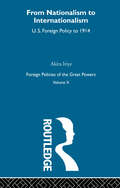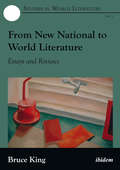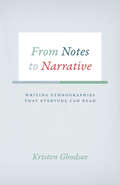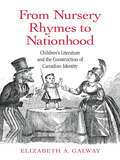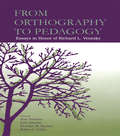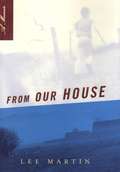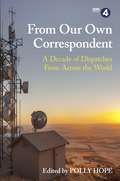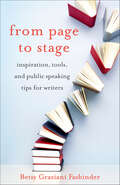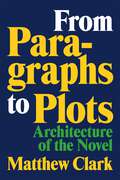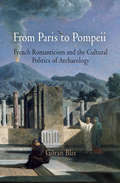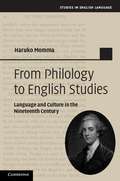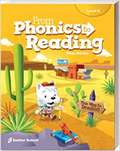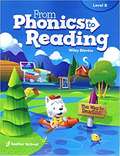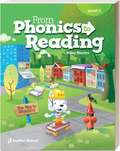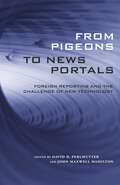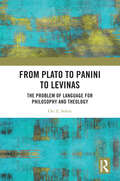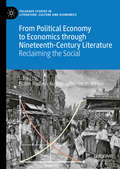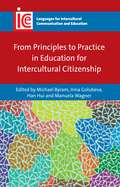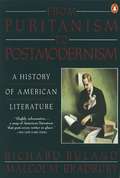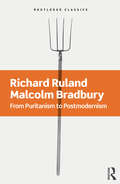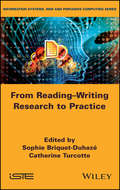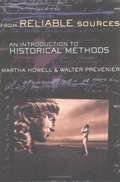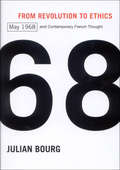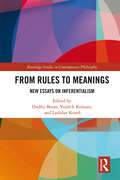- Table View
- List View
From National To Intnlsm V10: U. S. Foreign Policy Before 1917 (Foreign Policies Of The Great Powers Ser.)
by IriyeFirst published in 2001. Routledge is an imprint of Taylor & Francis, an informa company.
From New National to World Literature: Essays and Reviews (Studies In World Literature Ser. #3)
by Bruce KingFrom New National to World English Literature offers a personal perspective on the evolution of a major cultural movement that began with decolonization, continued with the assertion of African, West Indian, Commonwealth, and other literatures, and has evolved through postcolonial to world or international English literature. Bruce King, one of the pioneers in the study of the new national literatures and still an active literary critic, discusses the personalities, writers, issues, and contexts of what he considers the most important change in culture since modernism. In this selection of forty-five essays and reviews, King discusses issues such as the emergence and aesthetics of African literature, the question of the existence of a "Nigerian literature”, the place of the new universities in decolonizing culture, the contrasting models of American and Irish literatures, and the changing nature of exile and diasporas. He emphasizes themes such as traditionalism versus modernism, the dangers of cultural assertion, and the relationships between nationalism and internationalism. Special attention is given to Nigerian, West Indian, Australian, Indian, and Pakistani literature.
From Notes to Narrative: Writing Ethnographies That Everyone Can Read (Chicago Guides to Writing, Editing, and Publishing)
by Kristen GhodseeEthnography centers on the culture of everyday life. So it is ironic that most scholars who do research on the intimate experiences of ordinary people write their books in a style that those people cannot understand. In recent years, the ethnographic method has spread from its original home in cultural anthropology to fields such as sociology, marketing, media studies, law, criminology, education, cultural studies, history, geography, and political science. Yet, while more and more students and practitioners are learning how to write ethnographies, there is little or no training on how to write ethnographies well. From Notes to Narrative picks up where methodological training leaves off. Kristen Ghodsee, an award-winning ethnographer, addresses common issues that arise in ethnographic writing. Ghodsee works through sentence-level details, such as word choice and structure. She also tackles bigger-picture elements, such as how to incorporate theory and ethnographic details, how to effectively deploy dialogue, and how to avoid distracting elements such as long block quotations and in-text citations. She includes excerpts and examples from model ethnographies. The book concludes with a bibliography of other useful writing guides and nearly one hundred examples of eminently readable ethnographic books.
From Nursery Rhymes to Nationhood: Children's Literature and the Construction of Canadian Identity (Children's Literature and Culture)
by Elizabeth GalwayAs Canada came to terms with its role as an independent nation following Confederation in 1867, there was a call for a literary voice to express the needs and desires of a new country. Children’s literature was one of the means through which this new voice found expression. Seen as a tool for both entertaining and educating children, this material is often overtly propagandistic and nationalistic, and addresses some of the key political, economic, and social concerns of Canada as it struggled to maintain national unity during this time. From Nursery Rhymes to Nationhood studies a large variety of children’s literature written in English between 1867 and 1911, revealing a distinct interest in questions of national unity and identity among children’s writers of the day and exploring the influence of American and British authors on the shaping of Canadian identity. The visions of Canada expressed in this material are often in competition with one another, but together they illuminate the country’s attempts to define itself and its relation to the world outside its borders.
From Orthography to Pedagogy: Essays in Honor of Richard L. Venezky
by Robert C. Calfee Tom Trabasso John Sabatini Dominic W. MassaroFrom Orthography to Pedagogy pays tribute to Richard L. Venezky's work and influence on reading, linguistics, and computer science. This book catalogs findings related to speech and language development, reading and spelling's role in infant speech development, and the present and future advances in the study and theory of speech and cognitive development. The editors focus on the role technology could play in development and advancement of literacy speech and reasoning.Topics include:*speech directed at infants;*speech perception;*cognitive development and spelling;*early reading instruction;*reading and comprehension; and*influences of modern technology and multi-media.Representing a history of study in the field, this book appeals to anyone working in the area of language development, as well as those in related fields such as linguistics and developmental psychology.
From Our House: A Memoir
by Lee MartinMy father, when he was a boy, took it upon himself to change his name. My grandparents had named him Leroy Martin, but when he went to school and started learning cursive handwriting, he had trouble forming a capital ”L.” His answer to the problem was to drop the first two letters of his name and become, from then on, ”Roy.” If he couldn’t be “the King,” he would settle for merely “King.” So began his method for confronting obstacles with swift and decisive action. So begins the luminous and uniquely American memoir of Lee Martin, born into a farming family the same year his father unexpectedly lost both of his hands. Lee’s father, once known for ”doing a good turn for his neighbors,” changed that afternoon in the cornfields to become an embittered, hardened man. ”All our lives have private truths,” Martin writes, ”and the truth about my father was that after his accident he brought a deep and abiding rage into our home. I knew his hooks as intimately as I ever knew anything about my father.” Lee’s mother, called Beulah for the idyllic land at the end of John Bunyan’s The Pilgrim’s Progress, never gave up hope that salvation might one day find their home. ”How easily our bodies become us, our souls bound to the material, to the joy or grief or pain we feel through our skin,” Martin muses. Ultimately it is his mother’s quiet compassion that accounts for the grace that Lee and his father finally discover both within themselves and within their small family. Learning to live by the seasons and to fall asleep to the rumble of his father’s tractor, braving snowstorms to sell hogs or to visit an ailing grandmother, playing basketball, listening to baseball games, and stealing records, Lee endures the anger and shame that haunt his family— yet grows up to tell his tale with rare beauty and remarkable forbearance. From Our House, buoyed on every page by Martin’s deep humanity, is a wonderful book that bears all the marks of a classic. As Paul Eggers, author of Saviors, wrote: ”Every page resonates with a kind of beautiful ache, of memory rescued from anger by Martin’s compassion and yes, even wisdom. It is a heartbreakingly redemptive book, one quietly aflame with sorrow and forgiveness. Martin captures the very essence of the family romance and shows us how love—the real stuff, love that is intelligent and muscular and wide-awake— can transform even the most bitter of experiences into something approaching grace. I haven’t been this moved by a book in years.”
From Our Own Correspondent: Dispatches of a Decade from Across the World
by Polly Hope<p>For more than sixty-five years on the air, From Our Own Correspondent has been one of BBC Radio's flagship programmes. It has taken listeners to parts of the world where they have never gone, and perhaps never would: war zones, refugee camps, elite universities, space stations, spy academies and lions' dens of all sorts. Its dispatches introduce audiences to people they might never expect to meet - kingpins, revolutionaries, assassins and outcasts. It has always relied on the power of personal testimony, with its contributors not merely reporting the news, but sharing what they found out along the way, and how it felt. Its correspondents often relate the unexpected: the day they visited the town that is crazy about trout fishing, attended a forty-course Chinese banquet, experienced zero gravity on a flight with Russian cosmonauts, went mud wrestling in Turkey or ballroom dancing in Cameroon.<p> <p>Themed by continent and region, From Our Own Correspondent brings together the most compelling stories of the past ten years. It is a perfect primer for the understanding of the modern world.<p>
From Page to Stage: Inspiration, Tools, and Public Speaking Tips for Writers
by Betsy Graziani FasbinderIn this accessible, straightforward book, seasoned author Betsy Graziani Fasbinder offers readers the why, what, and how of public speaking, along with exercises and resources to support ongoing learning. She provides inspiration and encouragement to help writers to overcome their fears of public speaking, but she doesn’t stop there; she also lays out the practical, nuts-and-bolts tools they need to select, deselect, and arrange the content of what to say when they’re on a podium, in an interview, or in casual conversations about their writing, and includes a model for handling challenging questions from interviewers and audience members with confidence and grace. Part practical how-to—full of usable tools and tips—and part author cheerleader and champion, From Page to Stage is the ultimate resource for writers who wish bring their storytelling skills to their speaking opportunities.
From Paragraphs to Plots: Architecture of the Novel
by Matthew ClarkThe novel has often been characterized as the art form without a form. Although there may not be any rules for how to write a novel, as Matthew Clark shows in his new work of practical analysis, a good novel is as carefully formed as a good poem.From Paragraphs to Plots uncovers large compositional features of narrative construction, thereby excavating elements that constitute the architecture of the novel. Clark begins by discussing the segmentation of narratives, from the paragraph level up to the whole novel, with case studies of the composition of Jane Austen’s Emma and Virginia Woolf’s Mrs. Dalloway. The next chapter explores an important, though often neglected, feature of narrative architecture called ring composition: a particular kind of repetition where the beginning and the end of a text are the same or similar. From there, Clark analyzes in detail two novels, Ford Madox Ford’s The Good Soldier and Joseph Heller’s Catch-22, identifying the repetitions, inversions, links, and fragmented narrations that comprise each narrative.The book’s second half focuses on simple and complex plot forms. Examining iterations of simple forms—plots that begin with a specific initiating event and proceed in an essentially regular chronological progression from beginning to middle to end—Clark outlines several common beginnings (Arrival, Departure, Meeting, Need, Birth, Death) and endings (Departures, Returns, Marriages, Need Satisfied, Death), along with a short account of less common ways to begin a novel. Subsequent discussions examine devices used in complex plot forms, such as Beginning with the Ending, Second Chapter Retrospects, Ghosts from the Past, Multiple Retrospects, One-Day Novels, One-Year Novels, Mirror Plots, Simultaneous Narration, Unnatural Chronology, and Non-Narrative Elements. The final chapter draws together the preceding discussions with a detailed case study of a recent novel, Viet Thanh Nguyen’s Pulitzer Prize–winning The Sympathizer.By analyzing common practices of narrative construction, From Paragraphs to Plots identifies sources of beauty and meaning in literature, approaching the aesthetic and the thematic as simultaneous and inextricable.
From Paris to Pompeii
by Goran BlixIn the early nineteenth century, as amateur archaeologists excavated Pompeii, Egypt, Assyria, and the first prehistoric sites, a myth arose of archaeology as a magical science capable of unearthing and reconstructing worlds thought to be irretrievably lost. This timely myth provided an urgent antidote to the French anxiety of amnesia that undermined faith in progress, and it armed writers from Chateaubriand and Hugo to Michelet and Renan with the intellectual tools needed to affirm the indestructible character of the past.From Paris to Pompeii reveals how the nascent science of archaeology lay at the core of the romantic experience of history and shaped the way historians, novelists, artists, and the public at large sought to cope with the relentless change that relegated every new present to history.In postrevolutionary France, the widespread desire to claim that no being, city, culture, or language was ever definitively erased ran much deeper than mere nostalgic and reactionary impulses. Göran Blix contends that this desire was the cornerstone of the substitution of a weak secular form of immortality for the lost certainties of the Christian afterlife. Taking the iconic city of Pompeii as its central example, and ranging widely across French romantic culture, this book examines the formation of a modern archaeological gaze and analyzes its historical ontology, rhetoric of retrieval, and secular theology of memory, before turning to its broader political implications.
From Philology to English Studies
by Haruko MommaThe study of English language and literature in Britain changed dramatically between the end of the eighteenth century and the beginning of the twentieth. From Philology to English Studies explores the contribution of philology to this movement. Haruko Momma charts both the rise and fall of philology from antiquity to the late eighteenth century, and the impact of modern philology on the study of modern languages and literatures. Focusing in detail on the work of key philologists in the nineteenth century, Momma considers how they shaped European discourse and especially vernacular studies in Britain: William Jones's discovery of Sanskrit in British India gave rise to Indo-European studies; Max Müller's study of this same language helped spread the Aryan myth to the English-speaking world; the OED achieved its greatness as a post-national lexicon under the editorship of James Murray, a dialectologist originally from Scotland.
From Phonics to Reading
by Wiley BlevinsThis student book includes active, engaging, and thought-provoking resources that help students learn foundational skills and immediately apply them to reading, including letter or word cards, and more.
From Phonics to Reading: Level B
by Wiley BlevinsFrom Phonics to Reading incorporates explicit, researched-based phonics instruction with lessons that embody the Seven Characteristics of Strong Phonics Instruction. All thirty lessons in Level B contain a five-day systematic instructional sequence such as: Introduce Sound-Spelling, High Frequency Words, Build Fluency, Read Connected Text, Word Study, Writing Extension, Cumulative Assessment, etc.
From Phonics to Reading: Level C
by Wiley BlevinsThis student book includes active, engaging, and thought-provoking resources that help students learn foundational skills and immediately apply them to reading.
From Pigeons to News Portals: Foreign Reporting and the Challenge of New Technology (Media & Public Affairs)
by David D. Perlmutter John Maxwell HamiltonEver since the invention of the telegraph, journalists have sought to remove the barriers of time and space. Today, we readily accept that reporters can jet quickly to a distant location and broadcast instantly from a satellite-connected, video-enabled cell phone hanging from their belts. But now that live news coverage is possible from virtually anywhere, is foreign correspondence better? And what are the implications of recent changes in journalistic technology for policy makers and their constituents? In From Pigeons to News Portals, edited by David D. Perlmutter and John Maxwell Hamilton, scholars and journalists survey, probe, and demystify the new foreign correspondence that has emerged from rapidly changing media technology. These distinguished authors challenge long-held beliefs about foreign news coverage, not the least of which is whether, in our interconnected world, such a thing as "foreign news" even exists anymore. Essays explore the ways people have used new media technology -- from satellites and cell phones to the Internet -- to affect content, delivery modes, and amount and style of coverage. They examine the ways in which speedy reporting conflicts with in-depth reporting, the pros and cons of "parachute" journalism, the declining dominance of mainstream media as a source of foreign news, and the implications of this new foreign correspondence for foreign policy. Entertainment media such as film, television, and video gaming form worldwide opinions about America, often in negative ways. Meanwhile, live reporting abroad is both a blessing and curse for foreign policy makers. Because foreign news is so vital to effective policy making and citizenship, we imperil our future by failing to understand the changes technology brings and how we can wrest the best practice out of those changes. This provocative volume offers valuable insights and analyses to help us better understand the evolving state of foreign news.
From Plato to Panini to Levinas: The Problem of Language for Philosophy and Theology
by Ori Z SoltesThis volume offers an innovative exploration of Western social and religious thought and bridges the expression of a regional imagination with several planetary conversations. It reconnects Plato and philosophy to the issue of theology and religion and the limits of language as an instrument in engaging both disciplines. While beginning with the language problem as Socrates lays it out in Plato’s Cratylus, it wends its way through the Panini-inspired discussion of language across Western thought and turns to an examination of the idea of theodicy—the justice of God in its relationship to humans: how do the innocent suffer—for example, during the Holocaust—in a world made by God? The book ultimately turns arouand to consider how particular contemporary Indian thinkers have taken up both Western thought and the issue of language and its applicability to philosophy and theology. It thus offers new horizons in the Western World and India by connecting Plato’s Cratylus to the works of Saussure, Wittgenstein, Barthes, Derrida, Levinas, as well as to Panini, Aurobindo, Ranjan Dass, Giri, and the Gita. The volume will be of great interest to scholars and researchers of philosophy, linguistics, and religion.
From Political Economy to Economics through Nineteenth-Century Literature: Reclaiming the Social (Palgrave Studies in Literature, Culture and Economics)
by Elaine Hadley Sarah Winter Audrey JaffeFocusing on the transition from political economy to economics, this volume seeks to restore social content to economic abstractions through readings of nineteenth-century British and American literature. The essays gathered here, by new as well as established scholars of literature and economics, link important nineteenth-century texts and histories with present-day issues such as exploitation, income inequality, globalization, energy consumption, property ownership and rent, human capital, corporate power, and environmental degradation. Organized according to key concepts for future research, the collection has a clear interdisciplinary, humanities approach and international reach. These diverse essays will interest students and scholars in literature, history, political science, economics, sociology, law, and cultural studies, in addition to readers generally interested in the Victorian period.
From Principles to Practice in Education for Intercultural Citizenship
by Michael Byram Irina GolubevaThe contributors to this volume have collaborated to present their work on introducing competences in intercultural communication and citizenship into foreign language education. The book examines how learners and teachers think about citizenship and interculturality, and shows how teachers and researchers from primary to university education can work together across continents to develop new curricula and pedagogy. This involves the creation of a new theory of intercultural citizenship and a procedure for implementation. The book is written by teacher researchers who aim to help other teachers, and concludes with reflections on the lessons they have learnt which will help others to implement these ideas in their own practice. The book is essential reading for foreign language educators and researchers, students in pre-service teacher training and teachers in in-service training.
From Puritanism to Postmodernism: A History of American Literature
by Richard Ruland Malcolm BradburyA well-presented survey.
From Puritanism to Postmodernism: A History of American Literature (Routledge Classics)
by Richard Ruland Malcolm BradburyWidely acknowledged as a contemporary classic that has introduced thousands of readers to American literature, From Puritanism to Postmodernism: A History of American Literature brilliantly charts the fascinating story of American literature from the Puritan legacy to the advent of postmodernism. From realism and romanticism to modernism and postmodernism it examines and reflects on the work of a rich panoply of writers, including Poe, Melville, Fitzgerald, Pound, Wallace Stevens, Gwendolyn Brooks and Thomas Pynchon. Characterised throughout by a vibrant and engaging style it is a superb introduction to American literature, placing it thoughtfully in its rich social, ideological and historical context. A tour de force of both literary and historical writing, this Routledge Classics edition includes a new preface by co-author Richard Ruland, a new foreword by Linda Wagner-Martin and a fascinating interview with Richard Ruland, in which he reflects on the nature of American fiction and his collaboration with Malclolm Bradbury. It is published here for the first time.
From Reading-Writing Research to Practice
by Sophie Briquet-Duhazé Catherine TurcotteTeachers regularly seek to update their practice with newly-developed tools from the realm of research, with the aim of applying them directly in the classroom, particularly for teaching reading and writing. Thus, teachers’ continuing education is dependent on the effective dissemination and appropriation of research results. This book explores this problem from multiple angles, presenting research projects from France and Quebec, Canada. Using a variety of methods, including creating teaching materials and engaging classroom teachers in the research process, the authors demonstrate the importance of ownership and dissemination of research results in schools. Although this necessity sometimes complicates the work of researchers, it is vital to develop and maintain the relationship between reading–writing research and its practical applications.
From Reliable Sources: An Introduction to Historical Methods
by Martha C. Howell Walter PrevenierFrom Reliable Sources is a lively introduction to historical methodology, an overview of the techniques historians must master in order to reconstruct the past. Its focus on the basics of source criticism, rather than on how to find references or on the process of writing, makes it an invaluable guide for all students of history and for anyone who must extract meaning from written and unwritten sources. Martha Howell and Walter Prevenier explore the methods employed by historians to establish the reliability of materials; how they choose, authenticate, decode, compare, and, finally, interpret those sources. Illustrating their discussion with examples from the distant past as well as more contemporary events, they pay particular attention to recent information media, such as television, film, and videotape. The authors do not subscribe to the positivist belief that the historian can attain objective and total knowledge of the past. Instead, they argue that each generation of historians develops its own perspective, and that our understanding of the past is constantly reshaped by the historian and the world he or she inhabits. A substantially revised and updated edition of Prevenier's Uit goede bron, originally published in Belgium and now in its seventh edition, From Reliable Sources also provides a survey of western historiography and an extensive research bibliography.
From Revolution to Ethics
by Julian BourgChallenging the prevalent view that the 1960s did not have any lasting effect, From Revolution to Ethics demonstrates that intellectuals and activists turned to ethics as the touchstone for understanding interpersonal, institutional, and political dilemmas. In absorbing and scrupulously researched detail Bourg explores the developing ethical fascination as it emerged among student Maoists courting terrorism, anti-psychiatric celebrations of madness, feminists mobilizing against rape, and pundits and philosophers championing human rights.
From Ritual to Romance
by Jessie L. WestonAn examination and investigation of the Arthurian legends and "the Grail Problem."
From Rules to Meanings: New Essays on Inferentialism (Routledge Studies in Contemporary Philosophy)
by Ondřej Beran Vojtěch Kolman Ladislav KoreňInferentialism is a philosophical approach premised on the claim that an item of language (or thought) acquires meaning (or content) in virtue of being embedded in an intricate set of social practices normatively governed by inferential rules. Inferentialism found its paradigmatic formulation in Robert Brandom’s landmark book Making it Explicit, and over the last two decades it has established itself as one of the leading research programs in the philosophy of language and the philosophy of logic. While Brandom’s version of inferentialism has received wide attention in the philosophical literature, thinkers friendly to inferentialism have proposed and developed new lines of inquiry that merit wider recognition and critical appraisal. From Rules to Meaning brings together new essays that systematically develop, compare, assess and critically react to some of the most pertinent recent trends in inferentialism. The book’s four thematic sections seek to apply inferentialism to a number of core issues, including the nature of meaning and content, reconstructing semantics, rule-oriented models and explanations of social practices and inferentialism’s historical influence and dialogue with other philosophical traditions. With contributions from a number of distinguished philosophers—including Robert Brandom and Jaroslav Peregrin—this volume is a major contribution to the philosophical literature on the foundations of logic and language.
